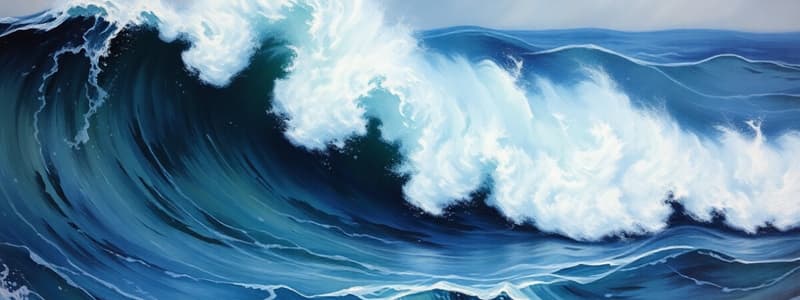Podcast
Questions and Answers
What primarily causes most ocean waves?
What primarily causes most ocean waves?
- Tides
- Earthquakes
- Underwater volcanic activity
- Wind (correct)
Shallow water waves have a shorter base than deep water waves.
Shallow water waves have a shorter base than deep water waves.
False (B)
What is a tsunami?
What is a tsunami?
A seismic sea wave
Ocean waves reach their maximum possible size and energy during a fully developed _____.
Ocean waves reach their maximum possible size and energy during a fully developed _____.
Match the type of wave with its characteristics:
Match the type of wave with its characteristics:
Flashcards
Deep Water Waves
Deep Water Waves
Waves that have a base (or wavelength) shorter than the depth of water they travel in.
Shallow Water Waves
Shallow Water Waves
Waves that have a base (or wavelength) longer than half the depth of the water they travel in.
Wind Waves
Wind Waves
Waves that are formed when wind transfers energy to the water surface.
Wave Interference
Wave Interference
Signup and view all the flashcards
Fully Developed Sea
Fully Developed Sea
Signup and view all the flashcards
Study Notes
Oceanography Wave Review
-
Deep vs. Shallow Water Waves: Deep water waves have shorter bases and longer wavelengths; shallow water waves have longer bases and shorter wavelengths. Depth is a factor.
-
Wave Refraction: Incoming waves bend around points on the shore. This is called refraction.
-
Wave Energy Transmission: As an ocean wave approaches shallower-depth (L/2), the water acts in a circular motion.
-
Wave Height/Length Theory: Theoretically, wavelength can be measured from crest-to-crest. Moderately-sized wind waves in the open ocean have a maximum height-to-length ratio of about 1:7 before breaking.
-
Types of Ocean Waves:
- Deep water waves
- Shallow water waves
- Transitional waves
-
Wave Velocity Factors: Wave height affects shallow water wave velocity.
-
Wave Formation: Mostly wind-generated
-
Seismic Waves: Seismic sea waves are called tsunamis.
-
Fully Developed Sea: A state where waves have reached their maximum size and energy.
-
Wave Interference: The interaction of two or more waves.
-
Swash Zone: The part of the littoral zone between the deepest and the shallow shoreline.
-
Standing Waves: These waves do not move laterally through the water but appear to stay in a fixed position with their crests and troughs.
Studying That Suits You
Use AI to generate personalized quizzes and flashcards to suit your learning preferences.



